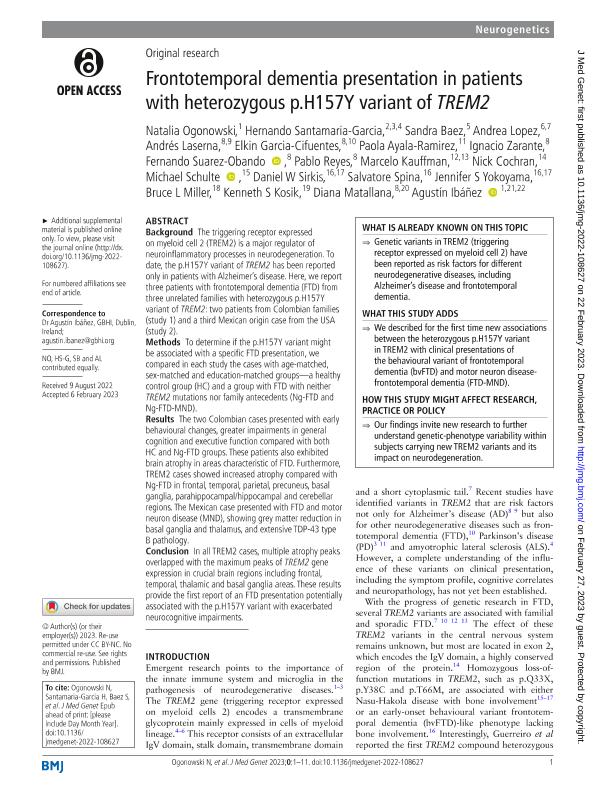Artículo
Frontotemporal dementia presentation in patients with heterozygous p.H157Y variant of TREM2
Ogonowski, Natalia Soledad ; Santamaria Garcia, Hernando
; Santamaria Garcia, Hernando ; Baez, Sandra; Lopez, Andrea; Laserna, Andrés; Garcia Cifuentes, Elkin; Ayala Ramirez, Paola; Zarante, Ignacio; Suarez Obando, Fernando; Reyes, Pablo; Kauffman, Marcelo Andres
; Baez, Sandra; Lopez, Andrea; Laserna, Andrés; Garcia Cifuentes, Elkin; Ayala Ramirez, Paola; Zarante, Ignacio; Suarez Obando, Fernando; Reyes, Pablo; Kauffman, Marcelo Andres ; Cochran, Nick; Schulte, Michael; Sirkis, Daniel W; Spina, Salvatore; Yokoyama, Jennifer S; Miller, Bruce L; Kosik, Kenneth; Matallana, Diana; Ibáñez, Santiago Agustín
; Cochran, Nick; Schulte, Michael; Sirkis, Daniel W; Spina, Salvatore; Yokoyama, Jennifer S; Miller, Bruce L; Kosik, Kenneth; Matallana, Diana; Ibáñez, Santiago Agustín
 ; Santamaria Garcia, Hernando
; Santamaria Garcia, Hernando ; Baez, Sandra; Lopez, Andrea; Laserna, Andrés; Garcia Cifuentes, Elkin; Ayala Ramirez, Paola; Zarante, Ignacio; Suarez Obando, Fernando; Reyes, Pablo; Kauffman, Marcelo Andres
; Baez, Sandra; Lopez, Andrea; Laserna, Andrés; Garcia Cifuentes, Elkin; Ayala Ramirez, Paola; Zarante, Ignacio; Suarez Obando, Fernando; Reyes, Pablo; Kauffman, Marcelo Andres ; Cochran, Nick; Schulte, Michael; Sirkis, Daniel W; Spina, Salvatore; Yokoyama, Jennifer S; Miller, Bruce L; Kosik, Kenneth; Matallana, Diana; Ibáñez, Santiago Agustín
; Cochran, Nick; Schulte, Michael; Sirkis, Daniel W; Spina, Salvatore; Yokoyama, Jennifer S; Miller, Bruce L; Kosik, Kenneth; Matallana, Diana; Ibáñez, Santiago Agustín
Fecha de publicación:
09/2023
Editorial:
B M J Publishing Group
Revista:
Journal Of Medical Genetics
ISSN:
0022-2593
Idioma:
Inglés
Tipo de recurso:
Artículo publicado
Clasificación temática:
Resumen
Background The triggering receptor expressed on myeloid cell 2 (TREM2) is a major regulator of neuroinflammatory processes in neurodegeneration. To date, the p.H157Y variant of TREM2 has been reported only in patients with Alzheimer's disease. Here, we report three patients with frontotemporal dementia (FTD) from three unrelated families with heterozygous p.H157Y variant of TREM2: two patients from Colombian families (study 1) and a third Mexican origin case from the USA (study 2). Methods To determine if the p.H157Y variant might be associated with a specific FTD presentation, we compared in each study the cases with age-matched, sex-matched and education-matched groups - a healthy control group (HC) and a group with FTD with neither TREM2 mutations nor family antecedents (Ng-FTD and Ng-FTD-MND). Results The two Colombian cases presented with early behavioural changes, greater impairments in general cognition and executive function compared with both HC and Ng-FTD groups. These patients also exhibited brain atrophy in areas characteristic of FTD. Furthermore, TREM2 cases showed increased atrophy compared with Ng-FTD in frontal, temporal, parietal, precuneus, basal ganglia, parahippocampal/hippocampal and cerebellar regions. The Mexican case presented with FTD and motor neuron disease (MND), showing grey matter reduction in basal ganglia and thalamus, and extensive TDP-43 type B pathology. Conclusion In all TREM2 cases, multiple atrophy peaks overlapped with the maximum peaks of TREM2 gene expression in crucial brain regions including frontal, temporal, thalamic and basal ganglia areas. These results provide the first report of an FTD presentation potentially associated with the p.H157Y variant with exacerbated neurocognitive impairments.
Palabras clave:
GENETICS
,
NEURODEGENERATIVE DISEASES
,
NEUROLOGY
Archivos asociados
Licencia
Identificadores
Colecciones
Articulos(IIMT)
Articulos de INSTITUTO DE INVESTIGACIONES EN MEDICINA TRASLACIONAL
Articulos de INSTITUTO DE INVESTIGACIONES EN MEDICINA TRASLACIONAL
Articulos(SEDE CENTRAL)
Articulos de SEDE CENTRAL
Articulos de SEDE CENTRAL
Citación
Ogonowski, Natalia Soledad; Santamaria Garcia, Hernando; Baez, Sandra; Lopez, Andrea; Laserna, Andrés; et al.; Frontotemporal dementia presentation in patients with heterozygous p.H157Y variant of TREM2; B M J Publishing Group; Journal Of Medical Genetics; 60; 9; 9-2023; 894-904
Compartir
Altmétricas



